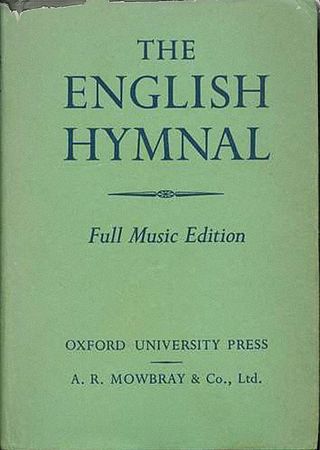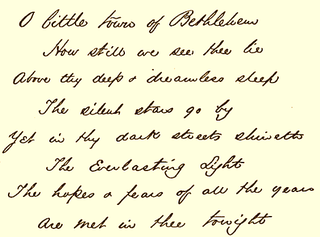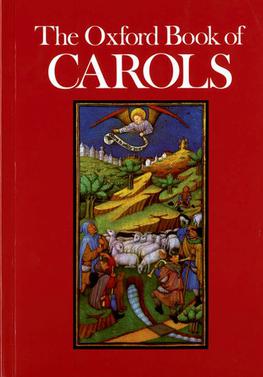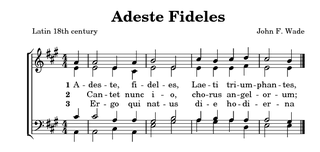Related Research Articles

"Love Divine, All Loves Excelling" is a Christian hymn by Charles Wesley on Christian perfection. Judging by general repute, it is among Wesley's finest: "justly famous and beloved, better known than almost any other hymn of Charles Wesley." Judging by its distribution, it is also among his most successful: by the end of the 19th century, it is found in 15 of the 17 hymn books consulted by the authors of Lyric Studies. On a larger scale, it is found almost universally in general collections of the past century, including not only Methodist and Anglican hymn books and commercial and ecumenical collections, but also hymnals published by Reformed, Presbyterian, Baptist, Brethren, Seventh-day Adventist, Lutheran, Congregationalist, Pentecostal, and Roman Catholic traditions, among others including the Churches of Christ. Specifically, it appears in 1,328 of the North American hymnals indexed by the online Dictionary of North American Hymnology, comparable to Newton's "Amazing Grace" (1,036), Wesley's "O for a Thousand Tongues" (1,249), and Watts' "When I Survey the Wondrous Cross" (1,483), though still well short of Toplady's "Rock of Ages" (2,139) or Wesley's own "Jesu, Lover of my Soul" (2,164).

The English Hymnal is a hymn book which was published in 1906 for the Church of England by Oxford University Press. It was edited by the clergyman and writer Percy Dearmer and the composer and music historian Ralph Vaughan Williams, and was a significant publication in the history of Anglican church music.

The New Oxford Book of Carols is a collection of vocal scores of Christmas carols. It was first published in 1992 by Oxford University Press (OUP) and was edited by Hugh Keyte and Andrew Parrott. It is a widely used source of carols in among choirs and church congregations in Britain.

"O Little Town of Bethlehem" is a Christmas carol. Based on an 1868 text written by Phillips Brooks, the carol is popular on both sides of the Atlantic, but to different tunes: in the United States, to "St. Louis" by Brooks' collaborator, Lewis Redner; and in the United Kingdom, Canada, and Ireland to "Forest Green", a tune collected by Ralph Vaughan Williams and first published in the 1906 English Hymnal.

Percival Dearmer (1867–1936) was an English Anglican priest and liturgist best known as the author of The Parson's Handbook, a liturgical manual for Anglican clergy, and as editor of The English Hymnal. A lifelong socialist, he was an early advocate of the public ministry of women and concerned with social justice. Dearmer, with Ralph Vaughan Williams and Martin Shaw, is credited with the revival and spread of traditional and medieval English musical forms. His ideas on patterns of worship have been linked to the Arts and Crafts Movement, while The English Hymnal reflects the influence both of artistic and folkloric scholarship and Christian Socialism. At his death, he was a canon of Westminster Abbey, from where he ran a canteen for the unemployed.

Martin Edward Fallas Shaw was an English composer, conductor, and theatre producer. His over 300 published works include songs, hymns, carols, oratorios, several instrumental works, a congregational mass setting, and four operas including a ballad opera.

Hymns Ancient and Modern is a hymnal in common use within the Church of England, a result of the efforts of the Oxford Movement. The hymnal was first published in 1861. The organization publishing it has now been formed into a charitable trust, Hymns Ancient and Modern Ltd, and as of 2022 it publishes a wide range of hymnals as well as other theological and religious books and magazines, under imprints such as the Canterbury Press and SCM Press.

Monk's Gate is a hamlet in the civil parish of Nuthurst, in the Horsham District of West Sussex, England. It lies on the A281 road 3 miles (5 km) southeast from Horsham.

"To Be a Pilgrim" is an English Christian hymn using words of John Bunyan in The Pilgrim's Progress. It first appeared in Part 2 of The Pilgrim's Progress, written in 1684.

The Oxford Book of Carols is a collection of vocal scores of Christmas carols and carols of other seasons. It was first published in 1928 by Oxford University Press and was edited by Percy Dearmer, Martin Shaw and Ralph Vaughan Williams. It became a widely used source of carols among choirs and church congregations in Britain.

"Thaxted" is a hymn tune by the English composer Gustav Holst, based on the stately theme from the middle section of the Jupiter movement of his orchestral suite The Planets and named after Thaxted, the English village where he lived much of his life. He adapted the theme in 1921 to fit the patriotic poem "I Vow to Thee, My Country" by Cecil Spring Rice but that was as a unison song with orchestra. It did not appear as a hymn-tune called "Thaxted" until his friend Ralph Vaughan Williams included it in Songs of Praise in 1926.

A hymn tune is the melody of a musical composition to which a hymn text is sung. Musically speaking, a hymn is generally understood to have four-part harmony, a fast harmonic rhythm, with or without refrain or chorus.

Geoffrey Turton Shaw was an English composer and musician specialising in Anglican church music. After Cambridge, where he was an organ scholar, he became a schoolmaster, then a schools inspector, while producing a stream of compositions, arrangements, and published collections of music. He was awarded the Lambeth degree of Doctor of Music.

"Puer nobis nascitur", usually translated as "Unto Us Is Born a Son", is a medieval Christmas carol found in a number of manuscript sources—the 14th-century German Moosburg Gradual and a 15th-century Trier manuscript. The Moosburg Gradual itself contained a number of melodies derived from the 12th- and 13th-century organum repertories of Notre Dame de Paris and the Abbey of Saint Martial, Limoges, suggesting that its antiquity may be much greater.

Henry Ramsden Bramley was an English clergyman and hymnologist perhaps best known for his collaborations with the composer Sir John Stainer. Along with earlier 19th-century composers such as William Sandys and John Mason Neale, Bramley and Stainer are credited with fuelling a Victorian revival of Christmas carols with their 1871 publication of Christmas Carols, New and Old, which popularised carols such as "The First Nowell", "God Rest You Merry, Gentlemen" and "The Holly and the Ivy".
Bunessan is a hymn tune based on a Scottish folk melody, first associated with the Christmas carol "Child in the Manger" and later and more commonly with "Morning Has Broken". It is named after the village of Bunessan in the Ross of Mull.
"The Rocking Carol", also known as "Little Jesus, Sweetly Sleep" and "Rocking", is an English Christmas carol by Percy Dearmer. It was translated from Czech in 1928 and is performed as a lullaby to the baby Jesus. The carol has also been known in English as the "Rocking" carol since an American edition in 1963. The carol has been recorded by Julie Andrews, Roger Whittaker and other artists.
George Archibald Forlong Jacob was an English arranger, composer and author, older brother of the composer and orchestrator Gordon Jacob.
References
- 1 2 3 Dearmer, Nan (1940). The Life of Percy Deamer. Jonathan Cape.
- ↑ Grove Music
- ↑ Preface to Songs of Praise, 1925 edition
- ↑ Boyce-Tillman, June (2022). "Hymns and soil theology". Practical Theology. 15 (5): 450–466. doi:10.1080/1756073X.2022.2099041. S2CID 252483618.
- ↑ McCutchan, Robert G. (1933). "Songs of Praise Discussed By Percy Dearmer. London: Oxford University Press, 1933. 560 pages. $2.25". Church History. 2 (4): 249. doi:10.1017/S0009640700120657. S2CID 162277622 . Retrieved 18 April 2020.